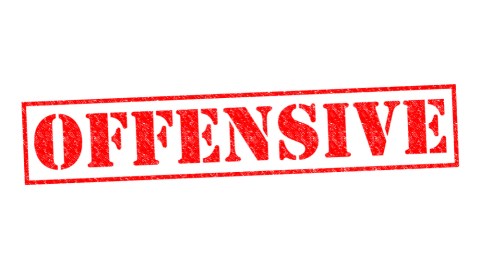Another Day, Another Offended College Student

The best works of literature challenge us and make us think, but some college students don’t want to be challenged, or to think too hard. The Internet is always abuzz with stories of censorship on college campuses. Coming from the right wing, you have stories of religious students (and often parents, unfortunately) who raise their objections to “immoral” books, films, and essays. Coming from the left wing, you have calls for “trigger warnings,” designed to safeguard those who’d rather not approach potentially uncomfortable themes in course reading materials. At our universities, there is an ever-burning desire to condemn and censor any ideas that are deemed troubling, insensitive, or just plain wrong, even though the avoidance of serious intellectual discourse is the exact opposite of what the college experience should be about.
Okay, let me take a step back; this topic really grinds my gears, so I’m probably not looking at it as objectively as I should. Speaking from experience, the vast majority of college students are eager to engage with challenging ideas and hear the opinions of others, even when disagreement may be strong. But the few who are unwilling to afford others their right to free speech sure are vocal in making a stink about it, and, from what I can tell, really enjoy seeing themselves in the news.
The offended party in question this time is Tara Shultz, a student who is pursuing an associate’s degree in English from Crafton Hills College. Shultz had this to say about Persepolis, Marjane Satrapi’s bestselling graphic novel that is considered an essential part of the feminist and postcolonialist canon:
“It was shocking, I didn’t expect to open the book and see that graphic material within. I expected Batman and Robin, not pornography.”
Problem number one: Anyone who expects Batman and Robin to grace the syllabus of a college-level literature course probably needs to realign their expectations, and may not be ready for the whole “college-level” thing entirely. That quote sounds like it could’ve been taken straight out of a comedy sketch lampooning politically-correct culture. College is not a place where discussion is confined to innocuous, fun-for-the-whole-family children’s fare, and those who take this position, however few in number, pose a threat to the future of academia, because the tendency among college leaders is to capitulate to the demands of the offended.
io9‘s Andrew Liptak raises an important point about this situation that I missed: Shultz’s offense may have arisen from her perception that graphic novels are exclusively for children, or at least deal in common, family-friendly tropes like superheroes and talking animals. Although that may sound true to the uninitiated, the graphic novel has pushed boundaries for a long time. Art Spiegelman’s renowned Maus tells a story of the Holocaust through anthropomorphic animal characters. To suggest that a particular art form is somehow immune from graphic content shows utter cluelessness about artistic innovation.
The college has said that in future semesters, it will add a disclaimer to the course’s syllabus. Perhaps they would be better off putting such a disclaimer at the campus gate, and inviting those who are unwilling to engage graphic content or opposing ideas to spend their time elsewhere.
Visit io9 for more, and watch John Sexton share his thoughts on the future of higher education:





